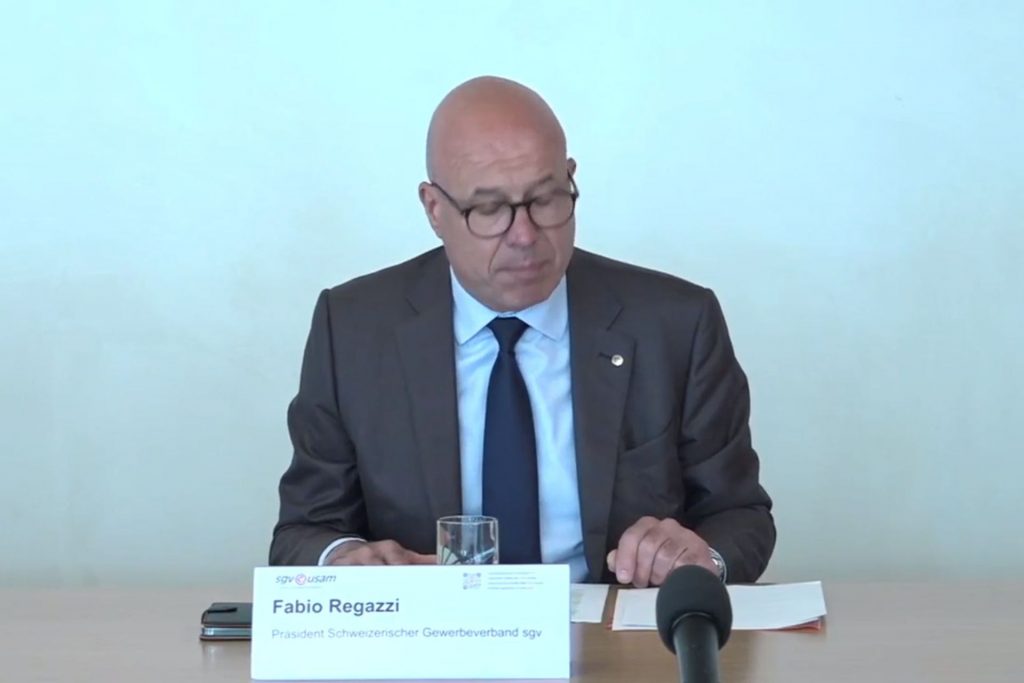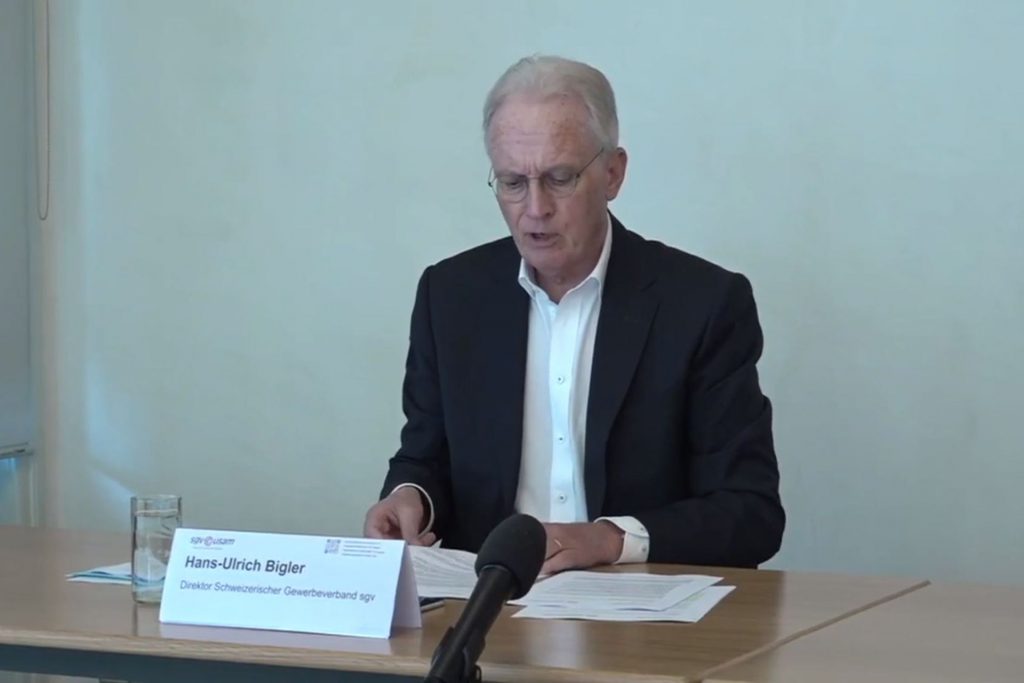“EU market access if it serves Swiss competitiveness”
The Swiss Arts and Crafts Union has formulated a series of specific and comprehensive proposals aimed at overcoming the stalemate in negotiations with Brussels
Swiss companies are fundamentally committed to access to the European Union’s internal market. At a press conference, however, the Swiss Arts and Crafts Union made it clear that it must be aimed at increasing the country’s competitiveness.
It must not be accompanied by the adoption of costly European regulations and the abandonment of Swiss strength and sovereignty. Maintaining and strengthening international competitiveness must remain the primary objective.
The USAM has developed a list of demands to achieve this goal, even without an institutional framework agreement.
Fabio Regazzi, PPD National Councillor and President of the Swiss Arts and Crafts Union, believes that the current draft of the institutional framework agreement is inadequate to maintain the competitiveness of the Confederation. The business community, but also some Cantons, were in fact critical of some elements of the agreement even at an early stage.

The controversial points and the red line of the negotiations are easily identifiable: the role of the European Court of Justice in resolving disputes, the accompanying measures for the protection of the labor market, the directive on the rights of EU citizens, the state aid regime and the so-called “guillotine clause”.
There is no doubt that access to the EU internal market is an important element for competitiveness. However, this access must be evaluated in an appropriate context. It is one of several methods to maintain and strengthen Switzerland’s position.
“However, if access to the European market is only possible by adopting costly European regulations and at the same time giving up Switzerland’s strengths and sovereignty, then it is counterproductive. In this form, we run the risk of losing our competitive position,” Fabio Regazzi told the media.

A unilateral adoption of EU law or an automatic adaptation to EU standards cannot be accepted without concessions or compensation from the EU.
Projects such as “Swisslex 2.0” or “Stabilex 2.0” have already highlighted these unilateral concessions to the EU. However, the precedent of stock exchange equivalence has shown that such concessions are not in themselves able to satisfy Brussels.
If negotiations on the institutional framework agreement and thus on market access fail, competitiveness can still be maintained and developed by other means, concluded the USAM president.
Strengthening the internal market remains Bern’s real priority
“An appropriate institutional arrangement is only one way to strengthen Switzerland’s competitiveness. The real way forward is to strengthen the domestic market in combination with the country’s international positioning in a competitive environment,” said USAM Director Hans-Ulrich Bigler.
For the Swiss economy, the most effective way to promote the competitiveness and productivity of companies is to introduce a brake on the burden of regulation, which requires that bills that result in increased bureaucracy or affect more than 10,000 companies must be submitted to and approved by parliament by a qualified majority.
The costs of regulation are currently estimated at around 70 billion francs per year. Businesses cannot influence these costs, nor can they offset them through savings in other areas.
Simply avoiding unnecessary regulatory costs would increase productivity throughout the economy and would itself constitute a growth program that would create and sustain jobs.
Adapting labor law to the needs of a changing labor market is another cornerstone of the revitalization program. Labor market flexibility is one of Switzerland’s greatest strengths as a business location.
However, it is hampered by the strict protective measures of labor law. The latter should be adapted to the realities of an increasingly digitized and flexible world of work.

In addition, the balance of social security systems must be restored by bringing their benefits into line with their financing. Rising ancillary wage costs and value added taxes undermine the competitiveness of the Swiss economy.
The introduction of a debt brake in the social insurance system must also guarantee its long-term financing, particularly for future generations.
Switzerland is known for the quality of its work. These characteristics are closely linked to Switzerland’s vocational education and training system, which plays a key role in the competitiveness of the Swiss economy.
Finally, Hans-Ulrich Bigler spoke about digitalization, which is transforming economic and administrative structures, thus helping to increase Switzerland’s competitiveness. However, SMEs could only benefit from this change if the transition took place in a free environment.
The principle of economic freedom applies in particular to digitization: “Everything that is not expressly prohibited or regulated by law is permitted,” concluded the USAM director on this point.
An international positioning apart from Europe
André Berdoz, Vice President of USAM, emphasized that Switzerland is an attractive international partner in the areas of trade in goods, investment, research and education, and as such can negotiate new free trade agreements or revitalize and modernize existing ones. As the world’s fifth largest economy, the United Kingdom, to which Switzerland is a net exporter, is also very attractive.
The USAM would also welcome an even more active role for Switzerland in diplomacy and international bodies, where it could best defend its interests.
“Good offices” would then have to be tied at least indirectly to quid pro quos or the provision of corresponding guarantees.
Curbs on spending and debt are part of the Swiss model of success. Tax competition keeps taxes relatively low while improving the quality of public services.
Switzerland is not alone in this policy. An alliance of like-minded countries could voice its concerns in international forums and block contrary initiatives.
The USAM vice president outlined one way Switzerland could deal with a possible failure of negotiations on the framework agreement with the EU. He said that Switzerland should think about this issue from a medium- and long-term perspective.

USAM supports the modernization of the 1972 Free Trade Agreement, which is also in the interest of the European Union. Switzerland is a customer of the EU, a net importer from various countries and is Germany’s ninth largest export market.
It is not in the interest of the EU to slam the door in its face.
The Free Trade Agreement must find solutions in the areas of rules of origin, cumulation of origin, customs, delivery formalities, transport and free movement of goods.
And with the “cohesion billion” Switzerland finally has a lever to use. An increase in the contribution to the development of the internal market to obtain compromises from the EU, for example to ensure participation in research programs, is also possible.
“As you can see, ladies and gentlemen, Switzerland’s international future is secured, even if the negotiations on this framework agreement fail,” concluded André Berdoz.







